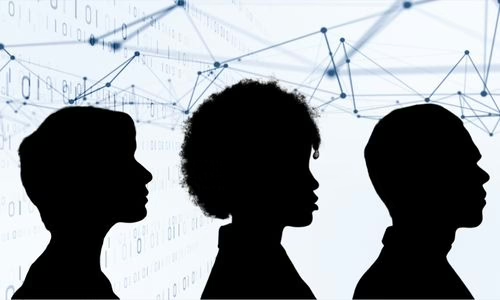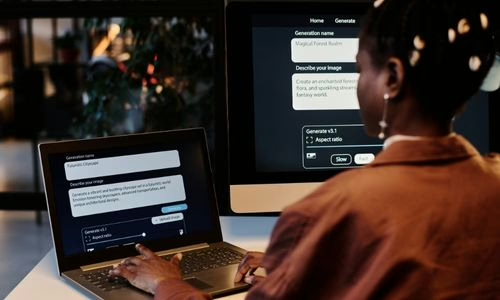AI in Talent Acquisition is no longer a futuristic concept—it’s here, now, and reshaping how businesses attract, evaluate, and hire talent. At our Human Capital Forum Event in Miami this April, AI emerged as a frequent talking point and a clear area of interest among attendees and speakers.
Across industries, AI is reshaping how we find and engage talent, from automating resume reviews to predicting candidate success with precision. These innovations promise faster, smarter, and more efficient recruitment strategies. But with that power comes new risks: bias, transparency gaps, and the erosion of the human touch.
The question is no longer if AI should play a role in recruitment—it’s how to implement it responsibly and leverage AI where it adds value, and double down on human judgment where it counts.
At TalentoHC, we believe AI should boost efficiency without compromising empathy, equity, or sound judgment. Intelligent tools can streamline hiring and sharpen decision-making—but without the right guardrails, they risk reinforcing bias and eroding trust.
Here’s what’s working, what’s raising red flags, and how forward-thinking companies can stay ahead.
How AI In Talent Acquisition Is Helping
Efficiency, Personalization & Insight

Smarter Hiring with Intelligent Automation
AI helps streamline time-consuming tasks like resume screening, interview scheduling, and applicant tracking. That means less time on logistics and more time building candidate relationships. These efficiencies are redefining hiring in the digital age, especially in high-volume roles or competitive markets.

Better Decisions with Predictive Analytics
By analyzing historical hiring patterns and performance data, AI tools offer predictive insights into candidate success. Unlike gut-based decisions, these data-informed judgments can reduce bias and lead to better long-term fits.

Elevated Candidate Experience
Chatbots, AI-driven FAQs, and real-time updates create a responsive and personalized experience for job seekers. But the key? Balance. When automation is paired with empathetic human communication, candidate trust and employer branding soar.
How AI In Talent Acquisition Is Hurting
Bias, Oversight & Ethical Risk

Algorithmic Bias
AI trained on biased data can unintentionally reinforce discrimination. A University of Melbourne study found that some systems may disadvantage candidates with accents or speech-related disabilities. Fair hiring requires more than smart tools—it takes intentional oversight. Start by assessing where you stand with our DEI Assessment.

Lack of Transparency
Black-box systems make it hard to explain why a candidate was rejected—or to challenge biased outcomes. Organizations must pair AI with clear protocols, audit trails, and the ability to justify decisions, especially in regulated or highly scrutinized sectors.

Over Reliance on Automation
AI should assist, not replace judgment. While adoption of various AI tools is increasing, many companies are still struggling to fully integrate AI in ways that enhance, not dilute, the human experience. Empathy, curiosity, and relationship-building remain irreplaceable.
What’s Emerging
Generative AI and the Next Hiring Frontier
Tools like Workday’s new Recruiter Agent are bringing generative AI into everyday recruiting workflows—automating tasks like writing job descriptions, suggesting interview questions, and engaging candidates through personalized outreach. These capabilities save time and reduce administrative lift, freeing up recruiters to focus on strategy and relationship-building.
When thoughtfully implemented, generative AI can help organizations attract and evaluate talent in entirely new ways. It enables more consistent communication, speeds up hiring timelines, and can even help surface non-obvious matches between candidates and roles.
But these gains come with real risks. Without proper training, oversight, and alignment with diversity and inclusion goals, generative AI can replicate systemic bias, create opaque decision-making processes, and weaken the human connection that candidates value. To get it right, organizations need both technical readiness and ethical intentionality—embedding AI into hiring processes with clear guardrails and human judgment at the core.
Need Workday-Certified Experts?
Workday talent starts here.
Tap into a network of certified Workday professionals ready to support your team—from implementation to optimization. Let’s build your bench with the right expertise.
AI Should Elevate the Human Experience
At TalentoHC, we see AI as a tool with potential, not a solution on its own. While we haven’t fully implemented AI across our operations, we’re actively exploring how it can support, not substitute, the human expertise that defines great hiring.
As we evaluate emerging tools, our focus remains clear: people first, always. That means prioritizing:
- Human oversight in any AI-assisted processes
- Equity and fairness as a guiding principle
- Transparency in how AI is introduced and applied
- Collaboration between technology and expert recruiters
Ultimately, candidates don’t want to be filtered—they want to be understood. Your AI should help you do that better, not just faster.
Action Steps
How to Implement Ethical AI in Hiring
- Audit your existing hiring data for bias before using it to train any AI.
- Choose AI vendors that prioritize explainability and fairness.
- Train your hiring teams to work alongside AI, not under it.
- Set clear KPIs: Use AI to track time-to-fill, retention, and candidate satisfaction.
- Conduct regular reviews of AI-driven decisions to ensure alignment with company values.

AI in talent acquisition is both a breakthrough and a balancing act. It brings speed, scalability, and data-driven precision—but also raises important questions about ethics, fairness, and the role of human judgment. The organizations that will lead the future of hiring aren’t choosing between AI and people—they’re bringing both together to build hiring experiences that are efficient, equitable, and deeply human.
What is AI in Talent Acquisition?
AI in Talent Acquisition refers to using artificial intelligence tools to enhance or automate parts of the hiring process, such as resume screening, candidate engagement, and decision-making.
How do candidates feel about AI in recruitment?
Surveys show mixed responses—candidates appreciate speed and updates but still value human interaction for interviews and decisions.
What’s the risk of overusing AI in hiring?
Overreliance can lead to poor candidate experiences, unexplainable rejections, and legal risks from potential bias or discrimination.
Can AI reduce bias in hiring, and how do I use it ethically?
AI has the potential to reduce human bias in hiring—but only if it’s implemented thoughtfully. Without careful oversight, AI can actually reinforce the very biases it aims to fix, especially if it’s trained on historical data that reflects past inequities.
To use AI ethically, ensure your tools are transparent, keep humans involved in key decisions, and conduct regular audits to identify and correct bias. Responsible use isn’t just about compliance—it’s about building a fairer, more inclusive hiring process.



